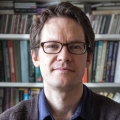Oxford Debate: 'There Is a Shared Korean Identity and Culture'
The Motion: North Korea and South Korea Want Reunification.
Dreams and Hopes vs. Realities and Stagnation in inter-Korean Relations: Ji-Young Lee, John Delury, Sandra Fahy, and Steven Denney debate over the motion "North Korea and South Korea want reunification."
Our Key takeaways
by Nico Luchsinger on Twitter
Reunification makes geopolitical sense, says Ji-Young Lee – the Korean Peninsula is surrounded by powerful countries. It would end the constant threat of war, and create economic benefits, at least in the long run.
But, counters Sandra Fahy, the idea of reunification is just at odds with reality. South Korea is a democracy, and North Korea an authoritarian dictatorship – the two are incompatible! If both sides wanted to reunify: Why haven't they done so already?
Just because it didn't happen yet doesn't mean they don't want reunification, says John Delury. There is a shared Korean identity and culture, and while South Koreans may be skeptical about the practical terms of reunification, no one is in favor of permanent division.
But ethnic identity is becoming less important in a increasingly multi-ethnic South Korea, argues Steven Denney – and the longer the countries are separated, the less pronounced the wish for reunification will be.
Motion
North and South Korea Want to Reunify.
Speakers
For the motion

Dr. Ji-Young Lee is associate professor at the School of International Service and C.W. Lim and Korea Foundation Professor of Korean Studies at American University, Washington, USA. Her research focuses on East Asian security at the intersection of history, area studies, and international relations. Her works concern the impact of China’s rise on the U.S. alliance system in East Asia today and South Korean foreign policy. She held several fellowships, among others at Oberlin College, East-West Center, Pacific Forum Center for Strategic and International Studies, East Asia Institute. Her current book project, The Great Power Next Door, is a historically informed analysis of when and how China has chosen to militarily intervene in the Korean Peninsula.

Dr. John Delury is professor of Chinese Studies and Chair of International Cooperation Program at Yonsei University, Seoul, South Korea. He is a historian of modern China and expert on US-China relations and Korean Peninsula affairs. He is a senior fellow of the Asia Society and Pacific Century Institute and member of the Council of Foreign Relations, National Committee on US-China Relations and National Committee on North Korea. He contributes regularly to Foreign Affairs, Foreign Policy, Global Asia, and 38 North. He served as founding associate director of the Asia Society Center on US-China Relations in New York. He is currently writing a book about US-China relations during the Cold War, focusing on the case of imprisoned CIA officer Jack Downey. He is also working on a series of articles on China-North Korea relations and co-authored book project with Patrick McEachern on North Korean politics and history.
Against the motion

Dr. Sandra Fahy is an associate professor of anthropology in the Faculty of Liberal Arts and the Graduate Program in Global Studies at Sophia University, Tokyo. She holds a PhD from SOAS University of London. She is the author of two books about human rights in North Korea. The first studies the subjective experience of famine survival: Marching through Suffering: Loss and Survival in North Korea. The second scrutinizes violations committed by the DPRK, domestically and internationally, and the state’s use of video technology to spread denial of rights abuse allegations: Dying for Rights: Putting North Korea’s Rights Abuses on the Record. Currently she is working at Harvard Law’s Human Rights Program as Visiting Fellow on a book project about state perpetrators who use audiovisual technology to deny rights violations.

Dr. Steven Denney is postdoctoral research fellow in the Innovation Policy Lab at the Munk School of Global Affairs and Public Policy, University of Toronto, Canada, and a senior policy analyst at the Brookfield Institute for Innovation and Entrepreneurship. His research covers the fields of migration, identity, and entrepreneurship. He has received research grants and fellowships for his studies on Korea and the Asia Pacific, ranging from the United Nations, the Institute for Unification Education, the Academy of Korean Studies (AKS), and the UniKorea Foundation, among others. His latest publication (with Peter Ward and Christopher Green, 2020) is The limits of ethnic capital: impacts of social desirability on Korean views of co-ethnic immigration, published in the Journal of Ethnic and Migration Studies.
About Oxford Debates
The Oxford-style format is broken down into four sections: opening remarks, an intra-panel discussion, a question-and-answer period, and closing remarks by both sides. Before the debate begins, the moderator shares the motion and each audience member casts their vote. Once both sides have shared their closing arguments, the audience places their final vote. The greater percentage change between the first and second votes determines the debate winner.
